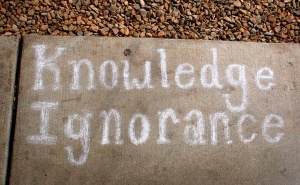Ownership of Ideas
In today's knowledge and information-based economies, a nation's wealth and prosperity are based on its resource of ideas. Copyright laws regulate this ownership of ideas, a system that evolved during an era when it was expensive to print, distribute and sell books and other learning materials. In the digital age, we can distribute ideas freely with the press of a button. We witness unprecedented opportunities to expand access to high quality educational resources. Nonetheless, much work is necessary to realize the potential of digital curriculum materials for our national education systems.
This subsection on the ownership of ideas sets the context for our global mission to return to the core business of education: to share knowledge freely.

"If you have an apple and I have an apple and we exchange these apples then you and I will still each have one apple. But if you have an idea and I have an idea and we exchange these ideas, then each of us will have two ideas."
—George Bernard Shaw
"Today, the process for capitalizing – either financially or socially – on innovation and creativity is staggering under the strain of a digital revolution of a speed and scale never seen before. At a time when many of their most valuable assets can be shared and exchanged easily, businesses and governments [are] scrambling to redefine who owns what."
—James Kanter, New York Times, 2005[1]
Pre-Knowledge
The following information is relevant to understanding the context of the video activity which follows:
- The Brothers Grimm were German academics who published collections of folk tales and fairy tales which became popular. The works of the Brothers Grimm are in the public domain and can be accessed from Project Gutenburg. Some of the Grimms’ stories were adapted and remixed as animated feature films by Walt Disney Animation Studios, including for example, Snow White, Sleeping Beauty, Cinderella and The Princess and the Frog.
- In terms of general copyright, works automatically enter the public domain usually after the life of the author plus 50 years. The Sonny Bono Copyright Term Extension Act of 1998 effectively froze the advancement date of the public domain in the United States by extending these terms to life of the author plus 70 years; and for works of corporate authorship to 120 years after creation or 95 years after publication, whichever endpoint is earlier.
Who Should Own Ideas?
This video video reflection provides a historical record from the perspective of two leading activists in the free culture:
- Eben Moglen, professor of law and legal history at Columbia University, and founder, director-counsel and chairman of Software Freedom Law Center, speaks on ownership of ideas.
Note this video is licensed under a cc-by-sa license and is incorporated into these materials under the original license out of respect for Eben Moglen’s leadership and work in promoting freedom. It would not be appropriate to request removal of the copyleft provision.
- Lawrence Lessig, professor of law at Harvard Law School and founder of Creative Commons, speaks on the idea of openness [3].
Before Watching the Video, Consider the Following Questions:
- Is it right to apply the word “theft” to reusing ideas to further learning?
- Who should own ideas? The producers of knowledge? The distributors of knowledge?
- What values should underpin our thinking regarding the ownership of ideas in education?
- Should educators and learners be required to ask permission before building on the ideas of others?
- How best can we foster an ecology of creativity in education?
Watch this video (15 minutes) with extracts from our two speakers reflecting on the ownership of ideas in a digital world.
References
- A New Battlefield: Ownership of Ideas by J. Kanter. Oct.3 2005. The New York Times.
- The System of Ownership of Ideas (video). E. Moglen (speaker) and C.M. Rainaud (producer). Dec. 17, 2004. Turin, Italy: ITC-ILO. Read the full transcript here.
- Lawrence Lessig: Reexamining the Remix (video). L. Lessig. March 2, 2010. New York: TEDxNYED.